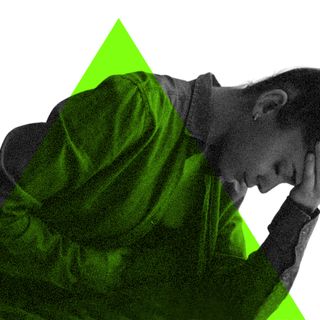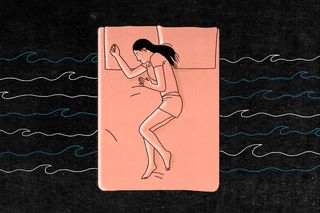
What It’s Like To Live With: Uncontrollable Urination at Night
“My mother doesn’t scold me anymore, but she does make fun of me — especially when something related to bed-wetting comes up.”

What It’s Like to Live With explores the stories of people who see and experience every day a little differently.
Please keep in mind the content of this article may cause emotional distress.
As kids, most people wet their bed, but it doesn’t generally continue beyond eight years of age, I’ve been told. In my case, however, it didn’t stop. Even after it stopped for my younger sister, it didn’t for me. My parents figured there might be something wrong with me and took me to see different doctors, who assured them it will stop once I’m a teenager. But it didn’t. I’m almost 21 now.
For a long time, some of my family members used to think I’m deliberately wetting my bed at night. My mother was very hard on me, and would ask, “Why can’t you just get up and go to the bathroom?” I was scolded, but it didn’t help. As much as I didn’t want to do it, it wasn’t in my control. None of my siblings had this “problem” — I used to wonder what is wrong with me?
When I’m awake, I can sense the urge to pee, but I can’t hold it in for very long.
I have memories of being told off for wetting the bed from as far back as when I was in first grade. I got so afraid that I would just change my clothes and wash them without my family finding out. To prevent it from happening, I would not eat or drink anything after 7 p.m. Even if I was thirsty, I just didn’t have water after the cut-off time. Not that this was able to prevent my incontinence, but I was still trying to do my best.
Throughout my teenage years, my parents continued to seek medical help for me. Every time I was taken to see a doctor, I would wish they found something very, very wrong with me — just so everyone would understand I was not doing this deliberately, so they would accept me. But they never found anything physically wrong with me.
Till now, no one knows exactly how this happens. I know people can sense the urge to urinate even when they are asleep — then, they get up to go use the washroom. But I can’t sense that. When I’m asleep, if I urinate, I am probably dreaming of a bathroom, and I can’t differentiate between the dream and reality. So, to my unconscious mind, it seems as if I’m using an actual bathroom when I’m peeing. Or, I’d be dreaming I was next to a waterfall, or there was a running tap near me. When I used to explain this to people, they would just laugh at me.
The doctors also said there was nothing much they could do, but gave me a tablet, which they felt could help reduce the incontinence. They used the term “bed-wetting” while diagnosing me; I discovered the condition is called nocturnal enuresis while using the internet to research on it and understand why it happens — other than physical conditions, turns out, the reasons could range from stress to hormonal changes.
Related on The Swaddle:
Urinary Incontinence in Women Linked to Poorer Mental Health, New Study Shows
Apparently, for most people who experience this, bed-wetting stops after taking the medicine I was prescribed. But it didn’t work for me even though I continued it for two years. After that, I resorted to taking a higher dose of the tablet, too, but that didn’t help either. In the last three years since, I’ve switched to ayurvedic medicine — again, not to much help.
During the 2020 lockdown though, I found it difficult to procure that medicine because it wasn’t available locally — so, I just stopped taking it. I mean, there wasn’t much point to it anyway. The interval of the episodes while I was taking different medicines, and now, is almost the same.
While the frequency of these incidents has decreased now, they still do happen. To avoid it, I try to follow a routine. I set an alarm to wake up at 3 a.m. and at 6 a.m. to use the washroom — and I can never fall asleep too early, no matter how sleepy I am. Over the years, I have become extremely conscious of my sleep cycle.
However, until I was at home, it was still easy to deal with the embarrassment. After I started going to college and staying at a hostel, it became even more difficult. I was worried about what people would think of me when they found out. I had to tell my roommates though — but it really bothered me that I may be disturbing their sleep by waking up in the middle of the night, and switching on the light sometimes, when I had to wash clothes. It was so stressful. Due to Covid19, I’ve come back home again, and it has been a little bit of a relief.
My mother doesn’t scold me anymore, but she does make fun of me — especially when something related to bed-wetting comes up on TV. She doesn’t know how much that affects me and hurts me. I know she still thinks I’m not doing my best to tackle this. My parents are worried about who will marry me, but they’re hopeful that it’ll stop somehow.
Living with this, and being blamed for not doing anything about it, has really affected my self-esteem. Even now, whenever it happens again, all my difficult memories from childhood come back. They’re very clearly etched in my memory. To this day, every incident is followed by a period of sadness.
Not eating and drinking properly has affected my appetite too. I’m underweight now — just 40 kgs. And because my water intake has always been very low, and still is, my skin is very dry. I’m trying to slowly fix these things; accepting that this is who I am, and it isn’t my fault, has been helpful.
Personally, I haven’t met anyone with this condition. I wonder if others like me, who are going through this, are feeling as lonely as I do. I hope learning my story helps them feel less alone.
This interview has been condensed and edited for clarity. As told to Devrupa Rakshit.
Devrupa Rakshit is an Associate Editor at The Swaddle. She is a lawyer by education, a poet by accident, a painter by shaukh, and autistic by birth. You can find her on Instagram @devruparakshit.
Related


Kerala Now Has 19 Cases of Zika Virus. How Is India Dealing With the Spread?
